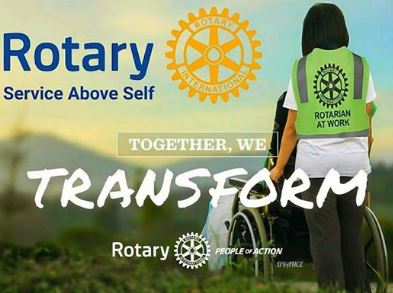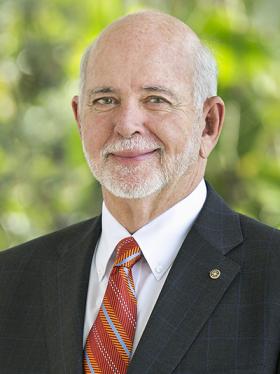April 2019
Every two minutes, somewhere in the world, a woman dies from preventable causes related to pregnancy and childbirth. And babies whose mothers die within the first six weeks of their lives are far more likely to die themselves than babies whose mothers survive. As I've traveled around the world as president of Rotary, I've met families for whom these aren't simply tragic statistics.
But I've also met people who are devoting themselves to helping mothers and children — and because of them, I'm hopeful. And because many of those people are Rotarians, I'm also proud. April is Maternal and Child Health Month in Rotary, so it's a perfect time to tell you about some things Rotarians are doing that will make you proud too.
Last fall, I paid a visit to a hospital in the town of Jekabpils, in Latvia. It's a modern hospital, and the doctors and nurses there are caring, dedicated, and skilled. But despite all their hard work, the maternal mortality rate at the hospital had remained stubbornly high, due to a factor that was beyond their control: a lack of vital diagnostic equipment and even basic items like incubators.
And that's where Rotary came in. Twenty-one clubs from around the world joined forces for a global grant that provided what the hospital required. And in September, when I walked into the maternity ward there, I saw state-of-the-art equipment, and I met patients who were getting the care that they needed and that every mother and child in the world deserves to have.
In Brazil, club members worked with fellow Rotarians in Japan on a global grant project that dramatically increased the capacity of an overstretched neonatal intensive care unit. New incubators, monitors, and other equipment have enabled the local hospital to save many more babies' lives each year.
And in Mongolia, a vocational training team from New Zealand organized instruction in emergency response techniques for doctors and midwives, set up a program that taught midwives modern best practices, and researched and wrote a culturally relevant childbirth education manual. Between 2013, when the team first went to Mongolia, and 2017, the neonatal mortality rate in the country fell from 11.2 to 9.1 per 1,000 births, and the maternal mortality rate has decreased as well.
That's what I mean when I talk about transformational service, and it's what Rotarians do best. Because of our networks, which span the globe; our community presence, which allows us to see what's most needed; and our expertise, which encompasses countless skills and professions, we're able to serve in a manner that has no equal. And we're able to Be the Inspiration as we help those who need us most.

In Nakivale, Uganda, one special Rotaract club is making a difference in its community — which happens to be a refugee settlement. These young leaders are turning what others might see as disadvantages into opportunities for service, building community and opening up new possibilities to those who are most in need of them.
In Turkey, Rotaractors are visiting children in the hospital every Wednesday to lift their spirits by playing games with them. They also are mentoring new students at their university and teaching them leadership skills.
Rotaractors are blazing the path for Rotary to be more relevant in this new century of service. And World Rotaract Week, which we're celebrating 11-17 March, is the perfect opportunity to get to know your local Rotaractors and talk to them about how your clubs can work together. If your Rotary club doesn't already sponsor a Rotaract club, know that you don't need to be near a college or university to do it: Community-based Rotaract clubs are a great option. And remember that Rotaractors are part of the Rotary family.
When Rotaractors are ready to leave their Rotaract club, we don't want them to leave that Rotary family behind. I'm asking all Rotarians to help them make the transition into a Rotary club or to start a new one: I'm happy to charter as many new clubs as we need to give everyone a place where they feel at home while making the world a little better. Service should be fun, it should be inspirational, and it should be open to all.
If there's one thing Rotary has always excelled at, it's diversity. In the past, that often meant diversity of profession, nationality, and outlook. We've made great strides when it comes to diversity of age and gender, and as we welcome more Rotaractors into our organization, we'll become even stronger.
Rotary is powerful. Together with Rotaract, it is unstoppable. Working side by side, we have the potential to Be the Inspiration in every part of society, to every person we meet.
In Turkey, Rotaractors are visiting children in the hospital every Wednesday to lift their spirits by playing games with them. They also are mentoring new students at their university and teaching them leadership skills.
Rotaractors are blazing the path for Rotary to be more relevant in this new century of service. And World Rotaract Week, which we're celebrating 11-17 March, is the perfect opportunity to get to know your local Rotaractors and talk to them about how your clubs can work together. If your Rotary club doesn't already sponsor a Rotaract club, know that you don't need to be near a college or university to do it: Community-based Rotaract clubs are a great option. And remember that Rotaractors are part of the Rotary family.
When Rotaractors are ready to leave their Rotaract club, we don't want them to leave that Rotary family behind. I'm asking all Rotarians to help them make the transition into a Rotary club or to start a new one: I'm happy to charter as many new clubs as we need to give everyone a place where they feel at home while making the world a little better. Service should be fun, it should be inspirational, and it should be open to all.
If there's one thing Rotary has always excelled at, it's diversity. In the past, that often meant diversity of profession, nationality, and outlook. We've made great strides when it comes to diversity of age and gender, and as we welcome more Rotaractors into our organization, we'll become even stronger.
Rotary is powerful. Together with Rotaract, it is unstoppable. Working side by side, we have the potential to Be the Inspiration in every part of society, to every person we meet.

